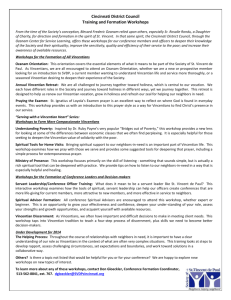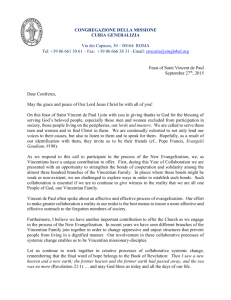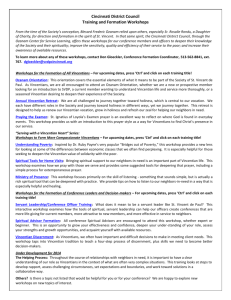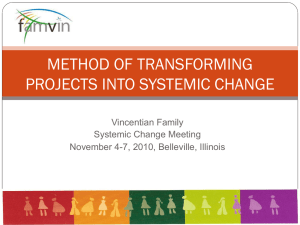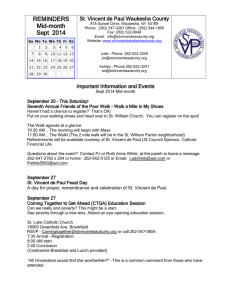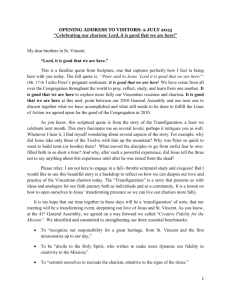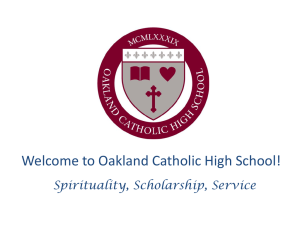SVDP Diocese of Austin Council- Building Spirituality Within with
advertisement
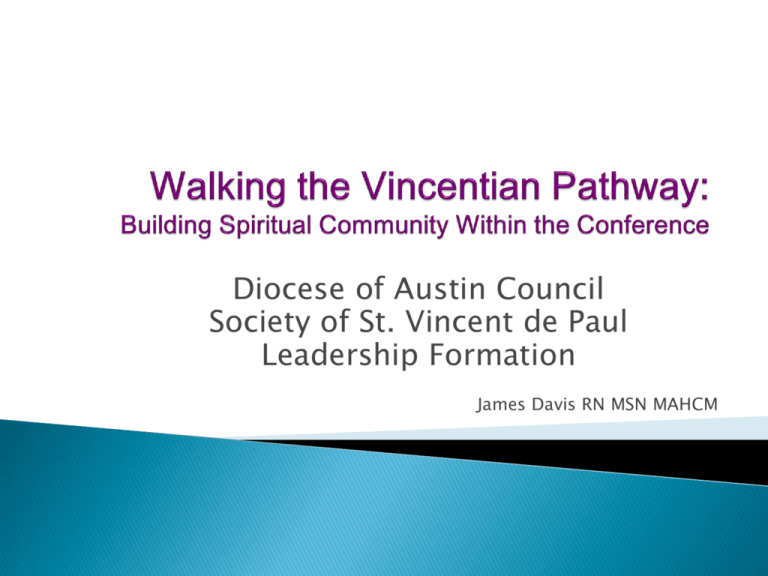
Diocese of Austin Council Society of St. Vincent de Paul Leadership Formation James Davis RN MSN MAHCM 1. The National Strategic Plan for education and formation and leadership development 2. Hay Vincentian Leadership Project Survey Findings 3. The genesis of the Vincentian Pathway 4. Components of the Vincentian Pathway 5. Implementing the Vincentian Pathway 6. Revitalizing and Expanding Vincentian Spiriuality 7. Challenges and Solutions He rose from supper, took off his outer garments. He took a towel and tied it around his waist. Then he poured water into a basin and began to wash the disciples feet…. Do you realize what I have done for you? You call me teacher and master and rightly so, for indeed, I am. If I therefore, the master and teacher have washed your feet you ought to wash one another’s feet. I have given you a model to follow. John 13:4-5; 12-14 #9. …If we wish to lead a dignified and fulfilling life, we have to reach out to others and seek their good. In this regard, several sayings of Saint Paul will not surprise us: “The love of Christ urges us on.” (2 Cor 5:14)… #10. …For here we discover a profound law of reality: that life is attained and matures in the measure that it is offered up in order to give life to others. This is certainly what mission means. Development of a “program that emphasizes unity, increases membership, offers formation and opportunities to develop leadership at every level of the Society.” 1. 2. 3. 4. Summarize the formation activities within the Society and to define Vincentian leadership development To better understand memberships’ perceptions and expectations of their own leadership skills and abilities To identify areas for skill development and training To offer recommendations of content and delivery systems for an integrated Vincentian leadership development program Spiritual Formation: Primary strength is our faith. Members feel called Ministerial Formation: View ourselves as advocates for the poor “visible sign of the Church…developing their selves in the ministerial formation Human Formation: Operating within a network of charity, members view themselves as part of a community. Articulation and identification of organizational values and leadership principles: Members not seeing the connections between spiritual values and leadership principles Standards, Guidelines and Accountability: Members identified the need to identify and communicate standards. Folks having a hard time figuring out how all of this fits together and aligns them. Communication: Desire to be nonjudgemental, frank and honest, live the values, but uncertain how to communicate frankly and candidly during times of change especially. Conflict management and negotiation requested Top Five: Communication, Team Building, Adapting to change, Coaching and Mentoring Conflict Negotiation and Resolution Training and leadership development should be based on four pillars: ◦ Vincentian Spirituality and Catholic Social Teaching ◦ Vincentian Heritage ◦ Vincentian Mission of Social Service ◦ Vincentian Leadership “The de Paul Leadership Project suggests a leadership development and formation program designed to build on the strengths of the Society and to assist the membership with seeing, understanding and experiencing the unified whole of Vincentian spirituality, heritage, mission of social service and leadership and it’s relationship with Society Works” Jesus modeled a life whereby service and leadership were two sides of the same coin. Therefore since Vincentians are called to service, we are also called to lead, whether or not we are in a formal position or titled to do so. In short, leadership is influence. When we influence others we are leading in some way. Consequently, we ask: “What is the Vincentian way of leadership?” The Vincentian Pathway is a way of asking and answering this questions. The term “pathway” was chosen because our lives are a continuing journey of growth.” A Resolution to approve the Vincentian Pathway - A Process for Ongoing Formation as a Vincentian…Growing in Vincentian Leadership: The Society has long recognized the need to develop skills, attitudes and training to help members fulfill the roles and responsibilities necessary to provide efficient, effective and efficacious service to those in need. All levels of leadership in the Society recognize the need to continue to enhance the development of competencies among the members to meet the ever changing needs and diversity of persons served. All Vincentians are Servant Leaders, grounded in Vincentian spirituality, friendship, and service. The Society envisions a membership engaged in spiritual formation and steeped in the Servant-Leadership model of St. Vincent de Paul, St. Louise de Marillac, Blessed Frederic Ozanam and Blessed Rosalie Rendu. This is a Pathway which begins with Ozanam Orientation, Serving in Hope and Invitation for Renewal and allows members to design and implement the formation and training most important for their roles. Spirituality: To provide an ever deepening understanding and appreciation of the founding charism, mission, vision, values and Rule of the Society. Friendship: To find mutual support, growth in vocation and the experience of living the Rule together. Through Conference and other Vincentian meetings to share the challenges and blessings found in home visits and direct contact with those in need. Service: To bring hope and tangible aid to those who are suffering or in need. To discover and strive to correct the root causes of this suffering through education, advocacy, and systemic change. To reflect the face of Christ and the love of God to those we serve. Servant Leadership: To familiarize all members with the characteristics of Servant Leadership To develop individuals who fill the ministry of leadership in the model of Christ and Vincent de Paul #188. The Church has realized that the need to heed this plea is itself born of the liberating action of grace within each of us, and thus it is not a question of a mission reserved only to a few: “The Church, guided by the Gospel of mercy and by love for mankind, hears the cry for justice and intends to respond to it with all her might. In this context we can understand Jesus’ command to his disciples: “You yourselves give them something to eat!” (Mk. 6:37) It means working to eliminate the structural causes of poverty and to promote the integral development of the poor, as well as small daily acts of solidarity in meeting the real needs which we encounter. Servant Leadership (Rule: Part 3, Statute 11) Leadership positions in the Society, at any level, are always to be accepted as service to Christ, the members and the poor. Servant leadership is done in imitation of Jesus who said: “For the Son of Man came not to be served but to serve, and give his life as a ransom for many. Presidents as Servant Leaders (Rule: Part 1, 3.11) Following Christ’s example, the Presidents at all levels of the Society endeavor to be servant leaders. They provide an encouraging atmosphere in which the talents, capacities and spiritual charism of the members are identified, developed and put to the service of the poor and the Society of St. Vincent de Paul. The President of the Conference or Council will have special responsibility for promoting Vincentian spirituality. The four components of the Vincentian Pathway are inter-related and as we are challenged and grow through one component, we will find challenge and growth through the others. This process will develop our Vincentian vocation and prepare us for the many and different Servant Leadership Roles that God may call us to assume throughout our Vincentian life. This is a tool to be used by the Conference President and Spiritual Advisor to guide Vincentians through their formation journey. Since 2000, Formation materials and programs have been created through Goal 1 of the Strategic Plan. Discovering, Developing, Deepening and Discerning our Vincentian vocation SPIRITUALITY □ Vincentian Reflections Used at Conference Meetings □ □ Ozanam Orientation Part III: What is our Vincentian Spirituality Serving in Hope Module I: Our Vincentian Vocation □ Rule Part I: Chapter 2 □ Manual Chapter 3: 2 Vincentian Spirituality DISCOVERING The Vincentian Pathway helps us to DISCOVER our Vincentian Vocation: FRIENDSHIP □ Ozanam Orientation Part I and Part II □ Serving in Hope Module VI: Our Vincentian Conference □ Rule Part I: Chapter 1 □ Manual Chapters 1:1 Vincentian Family and 1.2 SVdP □ Vincentian Celebrations Annual Commitment, Funerals and Wakes DISCOVERING The Vincentian Pathway helps us to DISCOVER our Vincentian Vocation: SERVICE □ Ozanam Orientation Part VIII: Home Visit □ Serving in Hope Module III: Our Vincentian Heritage □ Rule Part I: Chapter 4 □ Manual Chapters 3.1 Fund. Principles and 3.5 Vincentian Prayers □ Vincentian Celebrations Liturgy and Prayers for Founders DISCOVERING The Vincentian Pathway helps us to DISCOVER our Vincentian Vocation: SERVANT LEADERSHIP □ Ozanam Orientation □ Vincentian Leadership: Conference President I-VII □ Rule Part I: 5-6; Part III: Statute 11-21 □ Manual 2.1 Conferences □ Vincentian Celebrations: Commissioning Ceremonies: President and Officers Part IV-VII DEVELOPING The Vincentian Pathway helps us to DEVELOP our Vincentian Vocation: SPIRITUALITY □ Serving in Hope Module II: Our Vincentian Spirituality □ Rule Part III: Statute 1,2,4,9 □ Manual Chapter 4: Vincentian Saints and Blesseds □ Turn Everything to Love □ Faces of Holiness Chapter 1,2,6 Faces of Jesus and Mary DEVELOPING The Vincentian Pathway helps us to DEVELOP our Vincentian Vocation: FRIENDSHIP □ Serving in Hope □ Rule Module V: Our Vincentian Rule □ Part I: Chapter 3; Part III: Statute 3, 5,6,7 Manual Chapter 1.3 Rule and 2.5: Spiritual Advisors Turn Everything to Love Chapter 3,5,7 □ Faces of Holiness □ Faces of Vincent de Paul and Louise de Marillac DEVELOPING The Vincentian Pathway helps us to DEVELOP our Vincentian Vocation: SERVICE □ Serving in Hope Module IV: Our Vincentian Mission □ Rule Part I: Chapter 7; Part III: Statute 8 □ Manual Chapter 3.3 Sacred Scripture □ Turn Everything to Love □ Faces of Holiness Chapters 8-11 Faces of Frederic Ozanam and Rosalie Rendu DEVELOPING The Vincentian Pathway helps us to DEVELOP our Vincentian Vocation: SERVANT LEADERSHIP □ Vincentian Leadership: Council President Chapters 1-6 □ Rule Part III: Accountability—Statute 22-31 □ Manual Chapter 2.3,2.4 □ Youth and Young Adult Chapter 3-5 □ Turn Everything to Love Chapters 12-15 DEEPENING The Vincentian Pathway helps us to DEEPEN our Vincentian Vocation: SPIRITUALITY □ Diversity/Multicultural Session 1,2,3 □ Voice of the Poor Session 1,2 □ Systemic Change Prologue and Chapter 3 □ Social Justice Teachings Life and Dignity; Call to Family and Community Vincentian Servant Leader Listening and Empathy □ DEEPENING The Vincentian Pathway helps us to DEEPEN our Vincentian Vocation: FRIENDSHIP □ Diversity/Multicultural Session 4,5,6 □ Voice of the Poor Session 3,4,5,6 □ Systemic Change Chapter 4-6-9 □ Social Justice Teachings □ Vincentian Servant Leader Rights and Responsibility; Solidarity Healing, Awareness and Persuasion DEEPENING The Vincentian Pathway helps us to DEEPEN our Vincentian Vocation: SERVICE □ Diversity/Multicultural Session 7-10 □ Voice of the Poor Session 7-9 □ Systemic Change Chapter 12,13 □ Social Justice Teachings □ Vincentian Servant Leader Option for the Poor; Dignity of Work Conceptualization, Foresight, Stewardship DEEPENING The Vincentian Pathway helps us to DEEPEN our Vincentian Vocation: SERVANT LEADERSHIP □ Governance: Council/Board Chapter 2-7 □ Diversity/Multicultural Session 11-12, Appendix 1 □ Voice of the Poor Session 10 □ Social Justice Teachings The Care for God’s Creation □ Vincentian Servant Leader Workshop (DVD) DISCERNING All Vincentians are called to be servant leaders, and there are skills required of all Vincentians as conference members and when working on a committee. Some Vincentians are called to DISCERN a formal leadership role at some time in their journey. There are a set of skills that must be considered and supported for those willing to serve in formal leadership roles. DISCERNING • On the National Website, www.svdpusa.org, on the SVdP Members Information Site home page, there is a tab for Programs and Tools. Click on Pathway Toolbox and you will find a description of the resources available to fulfill the competencies needed for each leadership role. This is not an allinclusive list of resources available. As more resources become available the Pathway Toolbox will be expanded. DISCERNING • When you get to the Vincentian Pathway Toolbox page, you will find the following paragraph: • WALKING THE VINCENTIAN PATHWAY: This web page provides a resource list for the Vincentian Pathway program. There are four phases to the Vincentian formative journey: discovering, developing, deepening and discerning. The first three phases define the journey of all Vincentians. Phase IV, discerning, is that part of Vincentian formation in which we explore and prepare for our roles as leaders within the Society. To find the resources needed to help Vincentians through discovering, developing and deepening, click here. DISCERNING • When you click on “click here” you will get a list of resources – the same list as shown on page 8 of this document. The difference is that, when you click on one of those resources, you will be linked directly to where you can download or purchase the item listed. DISCERNING • The next paragraph on the Vincentian Pathway Toolbox page is the following: • The resources for phase IV, discerning, are identified below. You will find a list of competencies that each resource supports. Click on the name of the competency to see the supporting resources. The name of a resource, a brief description, and information on how to get this resource will appear on another page. The resources listed may be books, publications, seminars, webinars, and links to other web sources. The resources referred to here are for development of skill sets related to various roles of Vincentians. This web reference will grow as resources become available. VINCENTIAN FORMATION RESOURCE MATERIALS Order On Line: WWW.SVDPUSA.ORG Catalog and Order Form also available on web page Phone: 314-576-3993, ext. 210 A VINCENTIAN GUIDE TO DIVERSITY/MULTICULTURAL ISSUES FACES OF HOLINESS GOVERNANCE: COUNCIL AND BOARD OZANAM ORIENTATION (offered at the Council Level) SEEDS OF HOPE SERVING IN HOPE (English and Spanish) SPIRITUAL ADVISOR MANUAL SPIRITUAL ADVISOR TRAINING: (Members Information site-Documents) THE MANUAL (English and Spanish) THE RULE TURN EVERYTHING TO LOVE YOUTH AND YOUNG ADULT HANDBOOK VINCENTIAN CELEBRATIONS VINCENTIAN LEADERSHIP: CONFERENCE PRESIDENT VINCENTIAN LEADERSHIP: COUNCIL PRESIDENT VINCENTIAN SERVANT LEADER—WORKSHOP DVD AND DOCUMENTS CD VINCENTIAN REFLECTIONS (also available on svdpusa.org) VOICE OF THE POOR Serving in Hope • • • • • • • • Are your Councils/Conferences: Desiring to grow in spirituality? Wanting to renew? Then SERVING IN HOPE is the answer! MODULE I: Our Vincentian Vocation MODULE II: Our Vincentian Spirituality MODULE III: Our Vincentian Heritage MODULE IV: Our Vincentian Mission MODULE V: Our Vincentian Rule MODULE VI: Our Vincentian Conferenc Discerning A-Basic Competencies . E-Treasurer and Board Members o A1-Leadership o A2-Meeting Skills F-Spiritual Advisor o A3-Basic Fundraising G-Board Member o A4-Teams H-Council Presidents o A5-Systemic Change I-Council Spiritual Advisor o A6-Management Skills J-Development/Fundraising o A7-Personal Development K-Communication B-Conference President L-Voice of the Poor C-Person Responsible for Recruitment M-Diversity Committee Chair N-Strategic Goal Leader D-Secretary Implementing the Pathway Conference by Conference • What is the role of the Spiritual Advisor in your conference? – Encouraging Vincentian growth in “every” conference member. • What is the role of the President? – Allowing the needed time to “form” Vincentians during a Conference/Council meeting Implementing the Pathway Conference by Conference • Members of the Society are united in the same spirit of poverty and of sharing. They encourage one another to live a profound spiritual life and spirit of prayer. For this purpose, the role of a Spiritual Advisor is very important. (Rule: Part 3, 3.13) Implementing the Pathway Conference by Conference • Following Christ’s example, the Presidents at all levels of the Society endeavor to be servant leaders. They provide an encouraging atmosphere in which the talents, capacities and spiritual charism of the members are identified, developed and put to the service of the poor and the Society of St. Vincent de Paul. The President of the Conference or Council will have special responsibility for promoting Vincentian spirituality. (Rule: Part 1, 3.11) Implementing the Pathway Conference by Conference • The Vincentian Pathway itself integrates current formation that begins with the “Ozanam Orientation,” “Serving in Hope” modules, and “Invitation to Renewal,” as well as new and emerging materials to support ongoing Vincentian formation. – Help Conference members understand this process is intended to recognize the individual journey as well as the community journey and to strengthen current formation. Implementing the Pathway Conference by Conference • Frame the Conference Discussion in the context of the resolution: • SVdP National Strategic Plan includes development of a “program that emphasizes unity, increases membership, offers formation and opportunities to develop leadership at every level of the Society”. The Vincentian Pathway IS the selected program. Implementing the Pathway Conference by Conference • All levels of leadership in the Society recognize the need to continue to enhance the development of competencies among the members to meet the ever changing needs and diversity of persons served. This development must be grounded in the spiritual formation of Vincentians based on the charism of the Saints, and guided by Servant Leaders in the tradition of St. Vincent de Paul • The Vincentian Pathway design is based on the feedback from focus groups conducted by the Society with the help of consultants from Vincent on Leadership: The Hay Project at DePaul University Implementing the Pathway Conference by Conference • The Vincentian Pathway itself integrates current formation that begins with the “Ozanam Orientation,” “Serving in Hope” modules, and “Invitation to Renewal,” as well as new and emerging materials to support ongoing Vincentian formation. – Engage the group in discussion regarding how best to implement in the Conference. – Land on a plan and timeline and begin. Frequently Asked Questions • Why are we doing this now, how does it fit in? – The strategic plan points the Society specifically towards the ongoing transformation that will be necessary to optimize the changing needs of the poor and continue to attract and retain Vincentians. Commitment to the Catholic Social Justice Agenda impels the Society to adopt cutting edge strategies to impact poverty at all levels within communities. This requires ever more diligent spiritual formation and educational support for Vincentians. The Joy of the Gospel: EVANGELII GAUDIUM, APOSTOLIC EXHORTATION By Pope Francis • #199. Our commitment does not consist exclusively in activities or programmes of promotion and assistance; what the Holy Spirit mobilizes is not an unruly activism, but above all an attentiveness which considers the other “in a certain sense as one with ourselves”. This loving attentiveness is the beginning of a true concern for their person which inspires me effectively to seek their good. This entails appreciating the poor in their goodness, in their experience of life, in their culture, and in their ways of living the faith. Frequently Asked Questions • How does this support and exemplify the “Systemic Change” agenda the Society has identified as necessary to transform lives? – Transforming the lives of the poor and vulnerable through systemic change requires the willingness of Vincentians to continue to transform personally and as a community. The significant cultural changes needed to support individuals and families moving out of poverty calls Vincentians to influence society at many levels from person-to-person to the legislature. The core person-to-person work at the heart of the Conference must continue to evolve to attend to the increasing diversity and plurality of those served. This requires the next level of vigilance in personal formation. Personal and Community Spiritual Formation was at the heart of Ozanam’s intention. Frequently Asked Questions • How do we actually use this document? – The Conference Record is intended to support the President/Spiritual Advisors as they plan for ongoing formation. It will help to identify what has already been done, and what is needed, based on the specific issues and demands within each Conference. It will also increase awareness of available resources and stimulate Vincentian leaders to identify additional needs. The Joy of the Gospel: EVANGELII GAUDIUM, APOSTOLIC EXHORTATION By Pope Francis • #210. It is essential to draw near to new forms of poverty and vulnerability, in which we are called to recognize the suffering Christ, even if this appears to bring us no tangible and immediate benefits. I think of the homeless, the addicted, refugees, indigenous peoples, the elderly who are increasingly isolated and abandoned and many others. Frequently Asked Questions • Is there a formal reporting responsibility based on the document? • Use of the Conference Record supports a working plan for ongoing formation and can be used to keep Vincentians aware of the Conference expectations and offerings. It can also be used to help the President and Spiritual Advisors summarize, evaluate, and make changes to the Conference Formation plan as needed. Discussion Challenges And Solutions Blessed are the leaders who have not sought the high places, but who have been drafted into service because of their ability and willingness to serve. Blessed are the leaders who know where they are going, why they are going, and how to get there. Blessed are the leaders who know no discouragement, who present no alibi. Blessed are the leaders who know how to lead without being dictatorial; true leaders are humble. Blessed are the leaders who seek the best for those they serve. Blessed are the leaders who develop new leaders. Blessed are the leaders who march with the group, interpreting correctly the signs on the pathway that leads to success. Blessed are the leaders who have their head in the clouds but their feet on the ground. Blessed are the leaders who consider leadership an opportunity for service.
